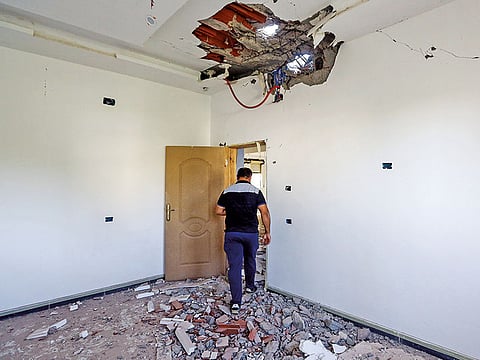Only thing certain in Libya is uncertainty
Since Gaddafi was ousted, militias and Daesh have engaged in turf wars for control of cities

Beirut: Dozens of people have been killed after days of violent clashes in the suburbs of Tripoli, with rival militias fighting fierce street battles for control of the Libyan capital.
The upheaval is the latest setback in the long running and highly chaotic effort to cobble together a government and restore stability after strongman Muammar Gaddafi was toppled from power during the height of the “Arab Spring” in 2011.
Since Gaddafi was ousted, dozens of militias and an Daesh affiliate have engaged in turf wars for control of Libya’s cities.
The recent violent clashes in the suburbs of Tripoli that left almost 50 people dead and 130 injured are the latest setback in a long running effort to cobble together a government and restore stability in Libya.
But the latest conflict is less about government authority than a power play for resources.
What’s happening now
Last week, a militia calling itself the 7th Brigade mobilized from its base in Tarhunah, a city about 64km southeast of Tripoli, and stormed the capital’s southern suburbs.
Billing itself as Libya’s “national army,” it attacked local militias working with the internationally recognized Government of National Accord, or GNA, and accused them of taking “public money” and “stealing people’s livelihoods.”
In response, the GNA ordered factions from neighbouring towns to come to its defence. It also declared a state of emergency, saying the attacks threatened the security of the capital and safety of its citizens.
Despite two truce agreements (which were almost immediately violated), the fighting left almost 50 people dead and 130 others injured in the last week, the World Health Organization said Monday.
More than 1,800 families have fled their homes and thousands more are expected to follow if the clashes intensify, the country’s Ministry of Displaced People’s Affairs reported. Those who remain risk being trapped in the midst of the violence.
Adding to the chaos, 400 inmates on Sunday broke out of Ain Zara, a prison in Tripoli, and the city’s only functioning airport was closed.
On Saturday, Stephane Dujarric, spokesman for the UN’s secretary general, decried the violence around the capital and the indiscriminate shelling by armed groups that seemed to be targeting civilians, including children.
Echoing the UN, the United States, France, Italy and Britain issued a joint statement Saturday condemning the attacks.
“These attempts to weaken the legitimate Libyan authorities and hamper the course of the political process are not acceptable,” the statement read. “We urge armed groups to immediately cease all military actions and warn those who tamper with security in Tripoli or elsewhere in Libya that they will be held accountable for any such actions.”
A day later, the UN invited “concerned parties” to hold “an urgent dialogue” on Tuesday.
Gassan Salame, the representative of the UN’s secretary general in the country, arrived on Tuesday for what the UN described as a “meeting on the security situation.” Later, it declared Salame had brokered a cease-fire agreement “to end all hostilities, protect civilians, safeguard public and private property + reopen [Mitiga] Airport in Tripoli.”
But it’s unclear how long the truce will hold up.
How did it come to this
Little has been straightforward in Libya since the overthrow of Gaddafi, who ruled the country for almost 42 years before he was pushed from power in a revolt backed by a Nato bombing campaign, with the US, France and Britain in the lead.
Gaddafi was later killed and the rebels declared Libya’s “total liberation.”
Instead, the country descended into chaos. Various groups, divided by tribal, regional, ideological and linguistic considerations, vied for power and frustrated repeated attempts to pull together a functioning government.
Eventually, two rival authorities emerged, each with its own state institutions.
The GNA, which has UN backing, controls the country’s western regions while the east is in the hands of the House of Representatives, the other government led by strongman Khalifa Haftar. (Daesh also had a presence near the town of Sirte and a slice of the country’s Mediterranean coast until 2015, when Haftar launched an offensive and scattered the extremists.)
Last year, France shepherded a political plan that called for both governments to establish a framework for elections that would be held this December. It is unclear whether the elections will held.
In the meantime, the lawlessness in the country and its proximity to Europe, have made it a transit point for thousands of migrants.
What’s it like in Tripoli
In Tripoli, multiple rounds of fighting have resulted in four militias affiliated with the GNA being put in charge of the capital’s security. But that relative stability has come at a price. According to a recent report by the Small Arms Survey, the de facto security forces have now morphed into a “functioning cartel” with powerful links to politicians and influential business executives.
The effect on Tripoli’s residents has been profound, with the militia controlling ports, airports, oil infrastructure and banks. It also impacted the availability of food, medicines and even currency.
“Withdrawing what is worth $50 of money from a bank has become a dream for citizens,” wrote Libyan commentator Abdul Razzaq Sarqan on the Libya Al Khabar website on Tuesday.
What happens next?
As rival forces continue to assemble around Tripoli and its environs, European governments, particularly Italy, fear the unrest could unleash another wave of migrants.
Meanwhile, the GNA is desperate to safeguard its presence, even from some of its supposed allies; GNA head Fayez Serraj has given militias loyal to his government until the end of the month to help secure Tripoli and then leave the capital.
But Haftar, with Egypt behind him, may take advantage of the chaos to sweep away his opponents and take over the government, analysts say.
Sign up for the Daily Briefing
Get the latest news and updates straight to your inbox


